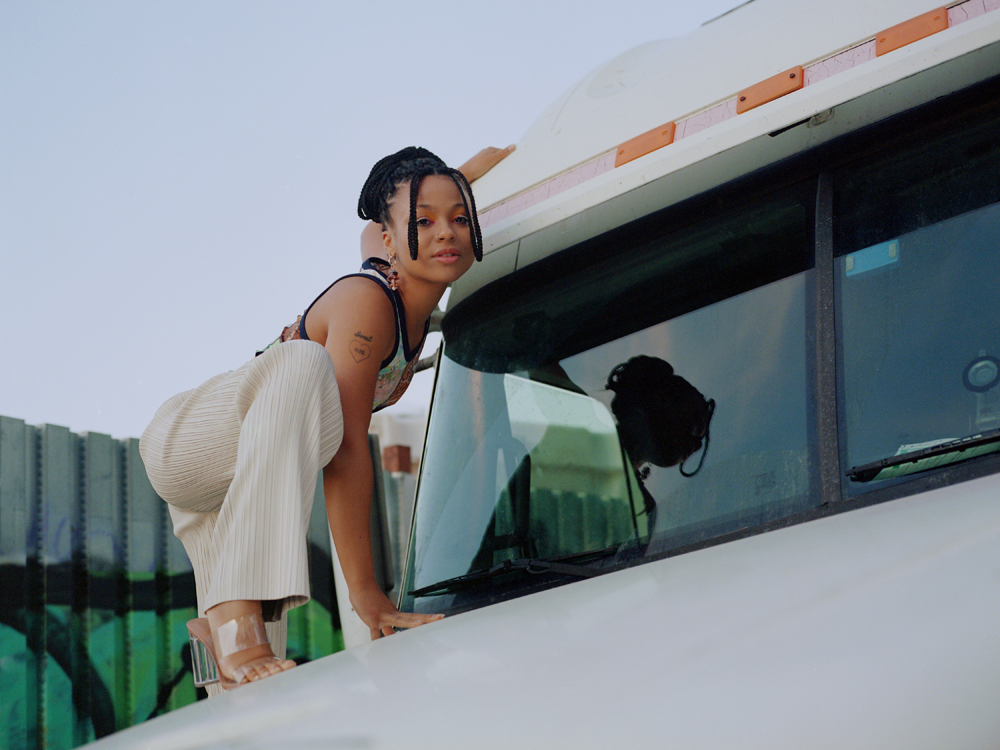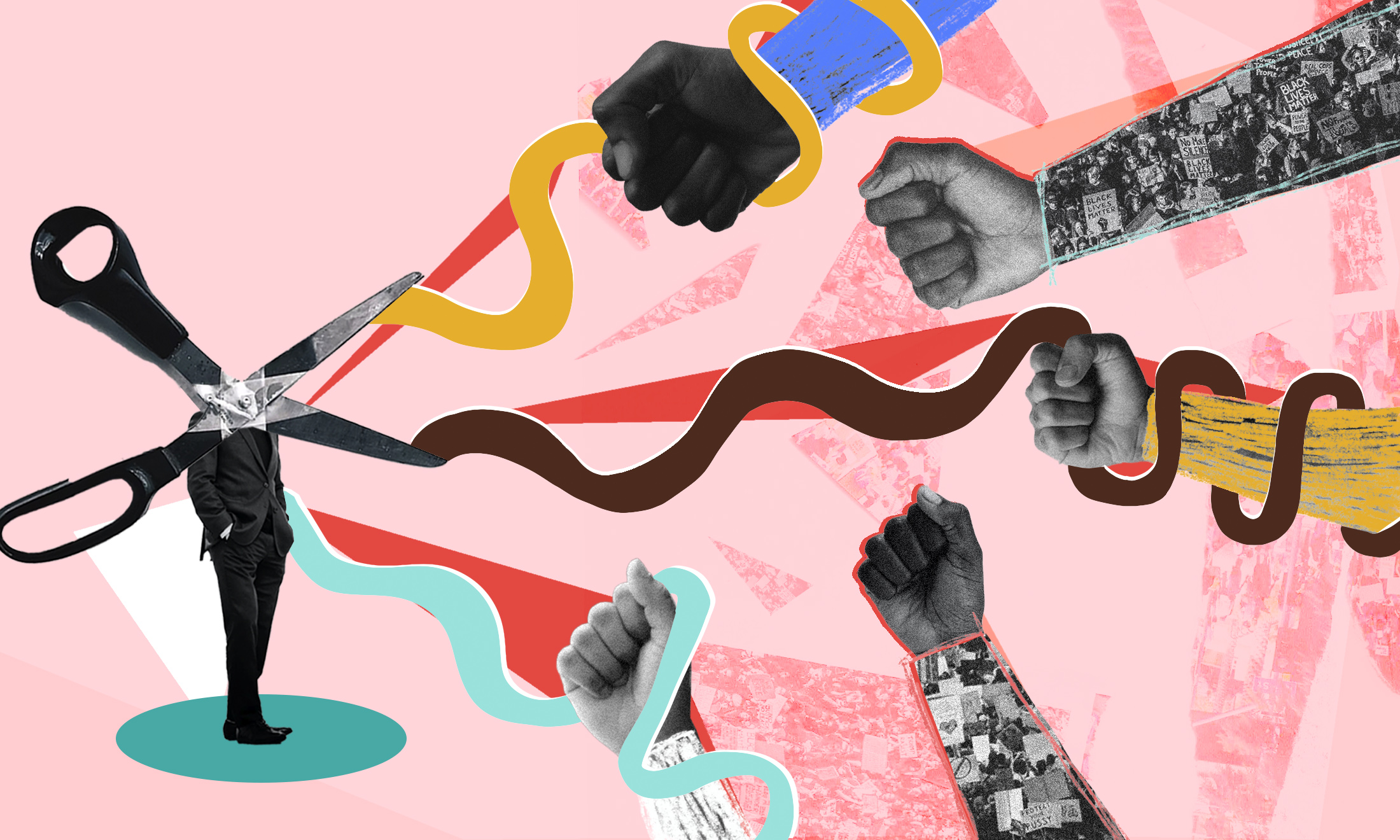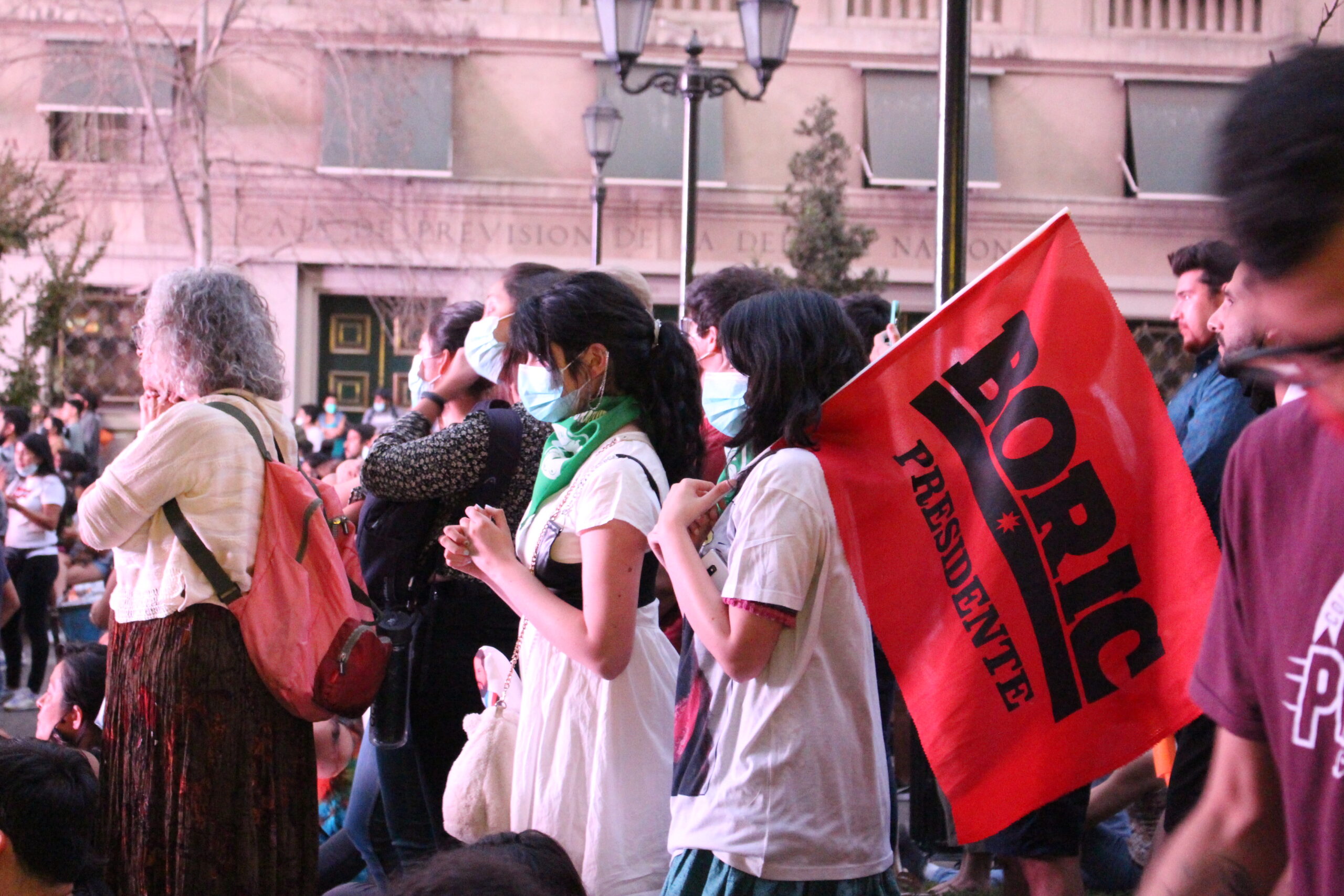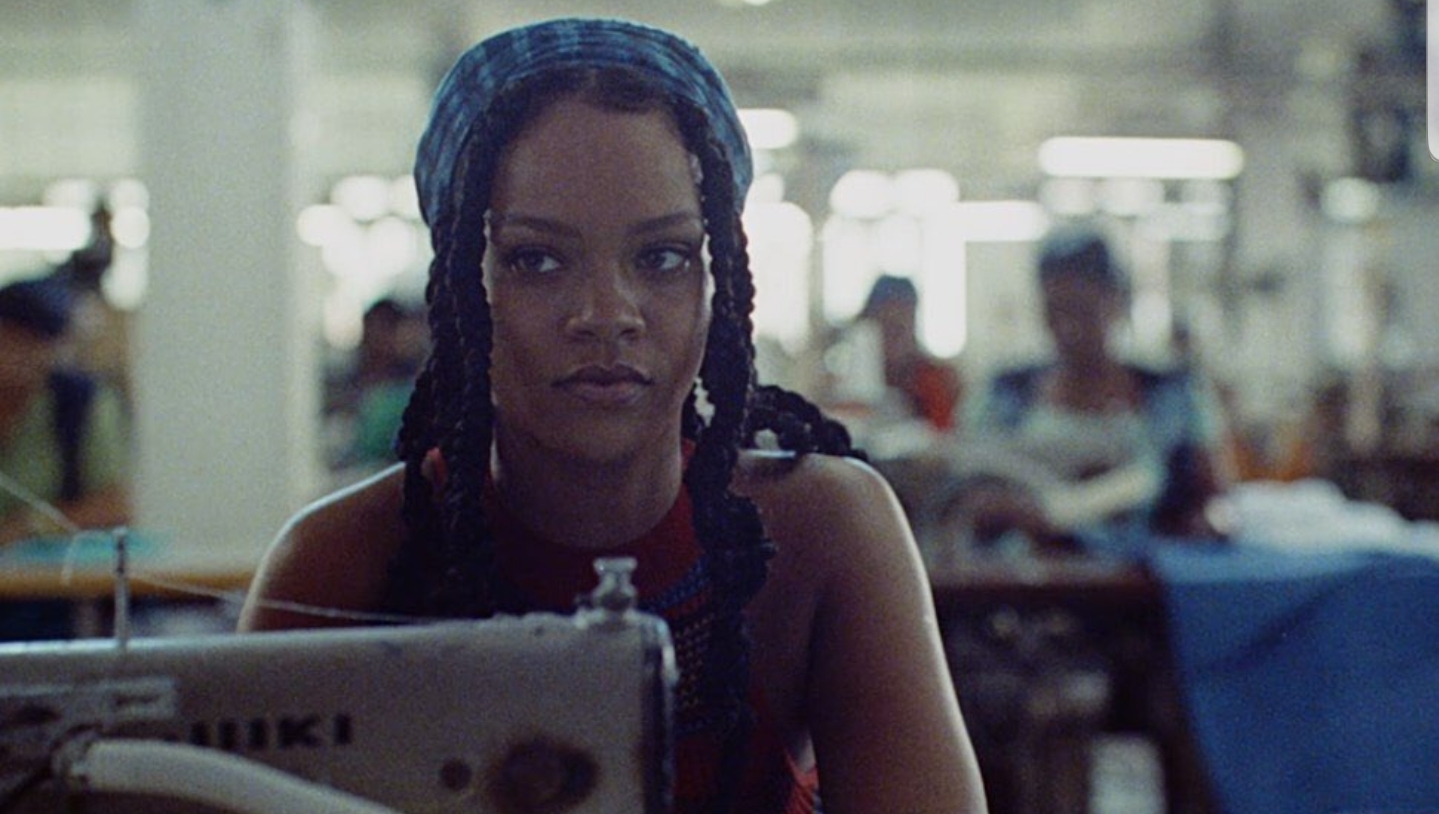
Image via Amazon Prime / Guava Island
Childish Gambino’s Guava Island is a sun-bleached daydream. The musical alter-ego of Donald Glover has been making sure his fans become well-acquainted with off-kilter art. While some critics have said that the film has “more style than substance”, there’s also an unexpected anti-capitalist message threaded through the narrative. The whole point of the 54-minute film is basically that black people deserve a break.
By now though, you’ll probably have seen the stunning shots of Rihanna as Kofi, Deni’s (Childish Gambino) dry-witted lover, as the two navigate island life. “We live in paradise but none of us actually have the time or the means to live here,” says Gambino as his character runs through the idyllic locations. While the film allowed fans to experience what a super couple the two musicians would make, the beautiful style of the diaspora, and new music from the upcoming Childish Gambino album, there’s a moral to the story.
Guava Island is a tropical mythical island home to a special worm that spins a blue silk so beautiful that it is loved by every man who sees it. “But, wherever there is love, war will follow,” Kofi explains in her narration. Of course, the war and pain inflicted on the people of Guava is, in this instance, linked to the tragedy of forced labour inflicted on indigenous people in places where spices, tea, cotton, sugar, and other exportable wonders were abundant. Eventually, the Red family take ownership of it all and over work the people of the island.
In this hyper-capitalist hell we’re currently experiencing, black people (like everyone else) have not only been taught to covet and consume, but to value themselves on the amount of work they do
When we meet Rihanna she is a seamstress making blue garments in a sterile textile workshop, and Childish Gambino is a reluctant lackey for Red Cargo. He’s late everyday and clearly has his sights set on making music, yet when he tries to explore his true passion he is threatened by Red and [spoiler] eventually killed.
Introducing the fictitious land of Guava allows Childish Gambino to bring in lots of stylistic elements from across the African diaspora. It’s a cue that this is an allegory that has relevance to all black people who share the same crude history of undervalued or forced work in a system that suppresses them. There’s themes that allude to the oppressive capitalist structure and how colonialism and slavery has historically robbed black people of their right to rest. Across the entire history of blackness civil rights leaders, front runners in slave rebellions and political minds have been assassinated. Fittingly, in the end, Deni becomes a martyr to the cause as he is shot by a masked figure at the forbidden festival. On the day of Deni’s funeral, Red checks in on his employees and realises that every single one of them is absent, opting instead to throw a street party in Deni’s memory.
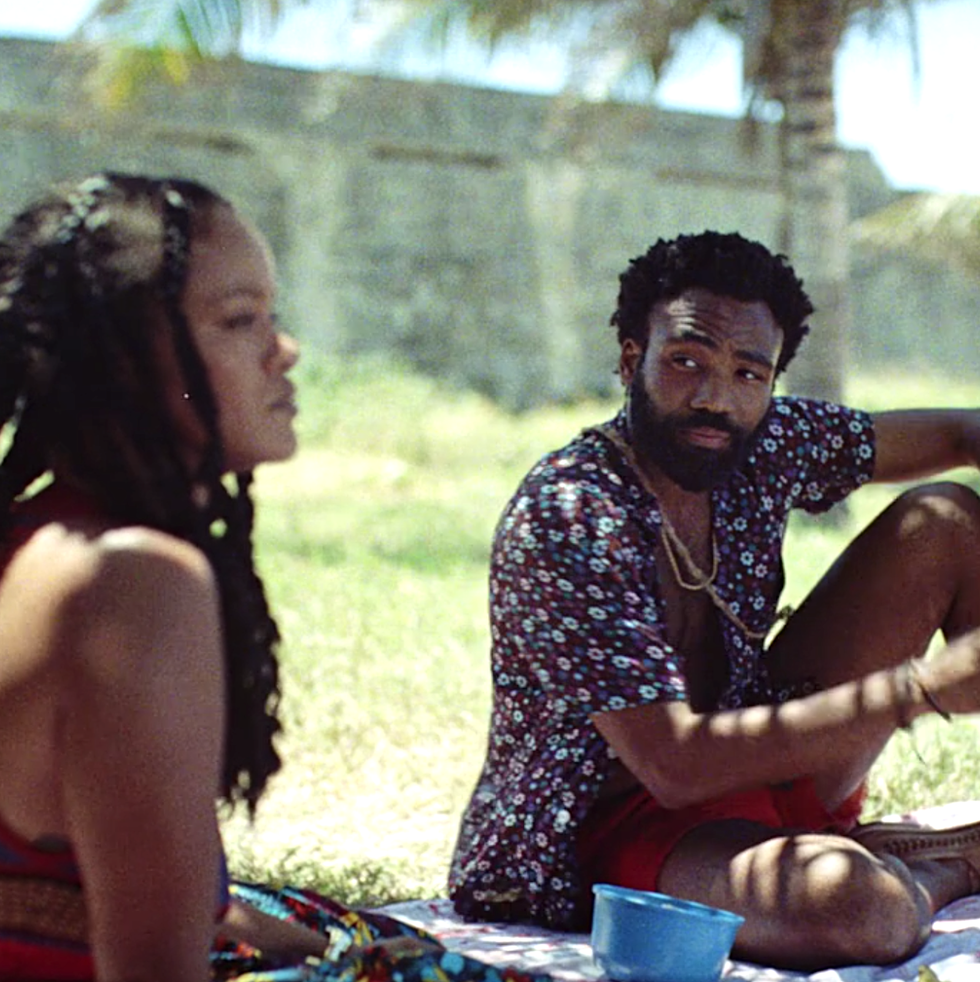
That’s a radical message. In this hyper-capitalist hell we’re currently experiencing, black people (like everyone else) have not only been taught to covet and consume, but to value themselves on the amount of work they do. Cue a whole generation obsessed with securing the bag and influencers motivating their followers via “let’s get this bread” and “Monday motivation” posts. The hype around books like Heart and Hustle by Patricia Bright, which coaches readers to cash in on side gigs, or Emma Gannon’s The Multi-Hyphen Method, which guides readers to balance their talents and projects, are a testament to this. In an age where many people’s full time jobs can’t sustain them financially or emotionally, the answer is to use the rest of your time to create the job you’d actually like to have. We’re fetishising being overloaded as if it a testament to how committed you are to bettering your circumstance not a grim indictment of a profit-driven society.
Pair this with the new dawn of influencers like The Slumflower, a woman who built a brand by preaching feminism and dating through the lens of financial gain and DJ Khaled telling people that the key to life is to “secure the bag”. The mantra is thriving, and instead of challenging the system we’re all just trying to find ways to clamber to the top of it. In this way, Guava Island feels like a timely divergence.
We’re in the middle of a crisis of work. According to YouGov 74% of UK felt “overwhelmed or unable to cope” with life at some point in the past year. This comes at the same time as the average full-time employee in Europe reporting that they spend about 40.3 hours a week working. People in the UK do around two billion hours of unpaid overtime each year and in November, a study conducted of almost 1,000 employees found that we’re barely taking most of our legally allocated lunch break. Insecure work, long hours, less rights, and fewer rewards have become normalised and criticism of this has been levelled at the rise of the gig economy and zero hour contracts and beyond. The New Statesman wrote about how these exploitative modes of work were exacerbating inequality, with a quarter of the 1.1million workers on zero hour contracts being black and minority ethnic.
It’s probably for this reason that in January, Buzzfeed questioned how millennials became the burnout generation, exploring how everything down to the handy round-the-clock communication channels we use like email and Slack had been tailored to make it easier to make people work outside of the traditional confines of the paid nine-to-five structure.
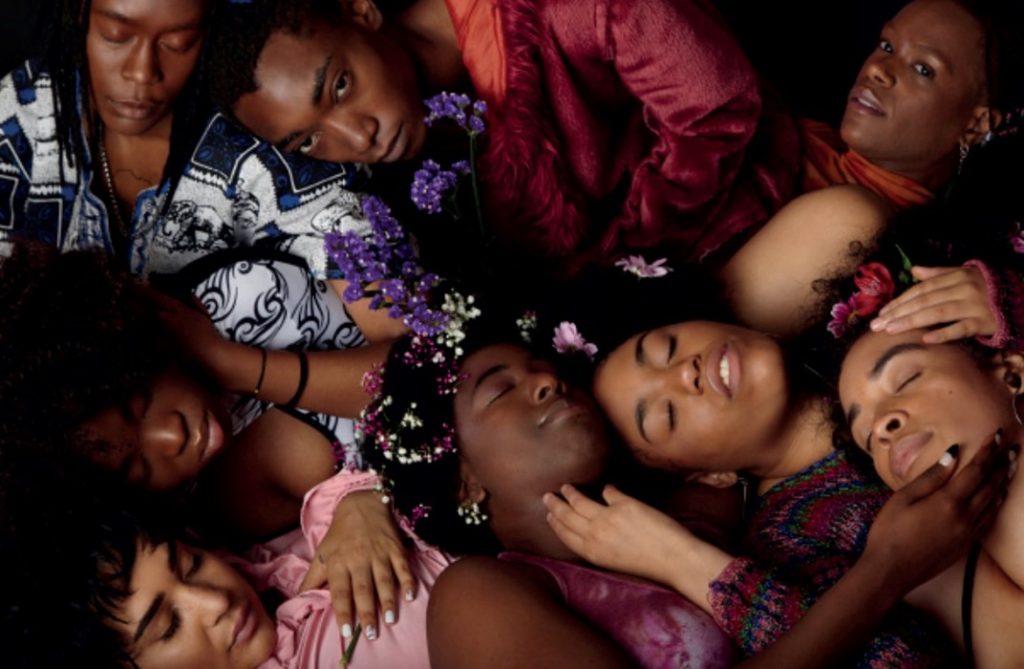
In Emma Dabiri’s new book Don’t Touch My Hair she has an excellent chapter that riffs on the extremely meme-able moment where Maxine Waters interjected in a congressional hearing that she was “reclaiming her time”. In it, she speaks of how colonial exploitation constricted the “once abundant” amount of time Africans had at their disposal into the constraints of the 24-hour clock that serves the capitalist structure of the West. We’ve grown so used to looking at the day like an industry timesheet – strategising how many hours of the day we can use to produce, and to work.
It’s perhaps no coincidence that Childish Gambino chose to set this tale against the scenic backdrop of Cuba, the first communist state in the Western hemisphere. Ideologically, the island is the exact opposite of America. This comes to a head during the sequence where Deni’s colleague tells him that he can’t wait to move to America where he can be free. As a retort he performs a reworked sequence of ‘This is America’. In this context lyrics like “I’ma go get the bag” and “get your money black man” gain new resonance as he highlights the trap of black people associating financial gain with freedom. These structures have only ever existed to oppress us.
Polls suggest that socialism is growing in favour in Britain, and the opinion towards capitalism has taken a dip in the US too. So that explains why there’s a rebellious spirit emerging in black art that wants to question the confines of capitalism that mirrors the small flourishes of anti-capitalist thinking being exhibited in pockets of the West.
Back in November, niv Acosta and Fannie Sosa hosted a large-scale exhibit and installation named Black Power Naps for two months at Madrid Pride which wanted to subvert the idea that black taking the time to rest made them idle or lazy. niv told Dazed: “‘Stay woke. You snooze, you lose. If you work hard you can achieve.’ Everything about progression for black people is deeply centred on constant labour.” As relaxation becomes the sole preserve of the wealthy who are deemed to have earned their right to rest, there’s a pretty well-documented racial sleep gap. It’s thought to be a hangover from how sleep deprivation has been used as a tool to oppress black people dating back to slavery. Think how many times you’ve heard that we must work twice as hard to be level with white counterparts and you start to see why black people need reassurance that its OK to pause.
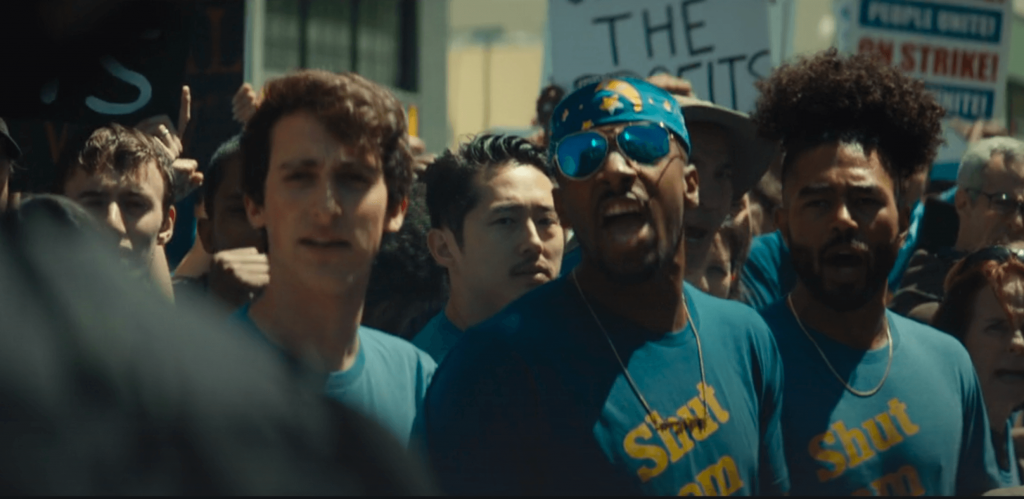
Boots Riley also brilliantly explored this in his surreal allegory Sorry to Bother You, that pitted labour movements against an exploitative system, Worry Free. It’s a slickly advertised work and leisure space owned by a faceless corporation that uses work perks and a dynamic environment to trap people into working constantly. In the same way that We Work offers a social space and beer to keep you in the office, or how Google has sleep pods so you never have to leave even if you’re exhausted, Worry Free is a rent free space where you can live for free in exchange for a lifetime work contract. It values profit over people to the extent that they were willing to turn workers into horses to make them more efficient. Many sequences of the film feature show the power of unions and collective action, while alluding to the cowardice of crossing picket lines. Riley, a communist said that the world of film had “edited out all rebellion”.
Let’s set aside, for one moment, the glaring criticism that Childish Gambino released Guava Island via Amazon, a behemoth corporation that is allergic to paying tax and has a dire record of worker’s rights. This film fits into a growing movement in art that is willing us to look at the forces that are pressuring us to run ourselves into the ground. In this way, Childish Gambino is carrying the mantle by showing what a unified movement towards a healthy work-life balance looks like. When Kofi says “We got our day”, it’s a message. Black people deserve their time to grieve, repair, and rest.



